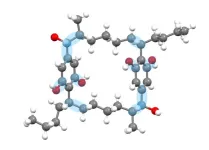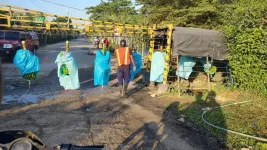(Press-News.org) PROVIDENCE, R.I. [Brown University] — By studying tomato varieties that produce fruit in exceptionally hot growing seasons, biologists at Brown University identified the growth cycle phase when tomatoes are most vulnerable to extreme heat, as well as the molecular mechanisms that make the plants more heat tolerant.
The discovery, detailed in a study in Current Biology, could inform a key strategy to protect the food supply in the face of climate instability, the researchers said. Agricultural productivity is particularly vulnerable to climate change, the study noted, and rising temperatures are predicted to reduce crop yields by 2.5% to 16% for every additional 1 degree Celsius of seasonal warming.
The scientists took some lessons from evolution to experiment with how best to speed up the adaptation process for varieties of tomato plants, explained study author Sorel V. Yimga Ouonkap, a research associate in molecular biology, cell biology and biochemistry at Brown. It would take a long time to wait for evolution to weed out the vulnerable tomato varieties like Heinz in favor of those that can handle extreme heat, a process that might also jeopardize the qualities that make vulnerable crops commercially desirable.
“We’re trying to figure out thermoregulation at a molecular and cellular level, and identify what and where we need to improve so that we can target those in commercial plant cultivars and conserve everything about them except for this one aspect that makes them vulnerable to extreme heat,” Ouonkap said. “Over time, you can start accumulating different resistance mechanisms as the growing conditions continue to change.”
Understanding thermotolerance, or the ability of a plant to withstand extreme temperatures, is a promising strategy to address climate adaptation, said study author Mark Johnson, a professor of biology at Brown.
“Imagine if you could just make a Heinz tomato more resilient to temperature stress without affecting the flavor profile or the way people experience the tomato,” Johnson said. “That would be a great advantage.”
Plant reproduction: a ripe area for research
The plant reproduction phase has been the focus of research in Johnson’s lab for many years. While the scientific literature includes studies of how heat stress affects plant growth in general, or the development of key reproductive structures, there was an absence of work that specifically examined what happens after pollen lands on the stigma during plant reproduction, Johnson said.
For Ouonkap’s thesis project, he focused on the pollen tube growth phase of the plant reproductive cycle. He studied different cultivars of tomato plants known for their ability to produce fruit in exceptionally hot growing seasons. The tomato varieties in the study were native to the Philippines, Russia and Mexico and were all grown in the Plant Environment Center at Brown.
Collaborating with scientists at the University of Arizona, Ouonkap studied how heat stress affects the ability of the pollen to grow in the flower of the tomato plant. He focused on how gene expression changes when tomato pollen produced by plants growing in optimal greenhouse conditions were exposed to high temperatures when growing in a petri dish.
The team’s partners in Arizona found that exposure to high temperature solely during the pollen tube growth phase limits fruit and seed production more significantly in tomato cultivars that were heat sensitive than those that were heat tolerant. Importantly, Ouonkap found that pollen tubes from the Tamaulipas variety of tomato, known to be tolerant to heat, have enhanced growth under high temperature. His molecular analysis of the pollen tube in these tomatoes allowed the research team to pinpoint the mechanisms that were associated with thermotolerance.
Tomatoes are an ideal organism for this kind of research, the researchers said. The ability of different varieties to adapt to a variety of extreme climates offer scientists insights into how species vary in their responses to environmental conditions. Tomatoes are also an important commercial crop in countries all over the world, from the Mediterranean to Egypt to Turkey to California — some of which are among the most vulnerable to extreme heat conditions.
With the right molecular mechanisms now identified, a next step would be determining specific techniques for enabling tomato growth in different climates. In one hypothetical scenario, scientists might develop a small molecule that could prime the pollen in the plants to be able to withstand a heat wave, Johnson explained.
“When the weather forecast showed two weeks of high temperatures during the pollen tube growth phase, the farmer would apply a product to plants that would change the gene expression so that the pollen would be resilient to heat,” he said.
While that type of manipulation is still far off in the future, the researchers said this area of research is ripe for exploration.
This project was funded by the National Science Foundation (IOS-1939255) with additional support from the United States Department of Agriculture National Institute of Food and Agriculture (2020-67013-30907, 2024-67012-41882) and the National institutes of Health (5R35GM139609, PI AEL).
END
Heartier Heinz? How scientists are learning to help tomatoes beat the heat
Biologists at Brown University found what makes some types of tomatoes more heat tolerant, yielding insights that could help crops adapt to climate change
2024-11-08
ELSE PRESS RELEASES FROM THIS DATE:
Breaking carbon–hydrogen bonds to make complex molecules
2024-11-08
A team of scientists led by Caltech and Emory University has synthesized a highly complex natural molecule using a novel strategy that functionalizes normally nonreactive bonds, called carbon–hydrogen (C–H) bonds. The work demonstrates a new category of reactions that organic chemists can consider as they work to create natural products that could be used in pharmaceuticals or new materials, or to produce organic chemicals in more sustainable ways.
"This work moves the field forward by showing the power of C–H functionalization," says ...
Sometimes you're the windshield: Utah State University researcher says vehicles cause significant bee deaths
2024-11-08
LOGAN, UTAH, USA -- When a large mammal such as a deer or a moose is struck by a motor vehicle, the damage is usually dramatic. To reduce these unfortunate events, transportation officials have teamed with wildlife researchers to place warning signs, and to construct wildlife underpasses and overpasses, to mitigate mishaps along animal migration paths.
In contrast, collisions with much smaller bees often go unnoticed or are perceived by motorists as simply an annoying splat on a windshield. The significance, Utah State University ...
AMS Science Preview: Turbulence & thunderstorms, heat stress, future derechos
2024-11-08
The American Meteorological Society continuously publishes research on climate, weather, and water in its 12 journals. Many of these articles are available for early online access–they are peer-reviewed, but not yet in their final published form.
Below is a selection of articles published early online recently. Some articles are open-access; to view others, members of the media can contact kpflaumer@ametsoc.org for press login credentials.
JOURNAL ARTICLES
A New Heat Stress Index For Climate Change Assessment
Bulletin of the American Meteorological Society
Heat Index may dramatically underestimate heat stress in extreme temperatures. This work compares the ...
Study of mountaineering mice sheds light on evolutionary adaptation
2024-11-08
Teams of mountaineering mice are helping advance understanding into how evolutionary adaptation to localized conditions can enable a single species to thrive across diverse environments.
In a study led by Naim Bautista, a postdoctoral researcher in Jay Storz’s lab at the University of Nebraska–Lincoln, the team took highland deer mice and their lowland cousins on a simulated ascent to 6,000 meters. The “climb” ventured from sea level and the mice reached the simulated summit seven weeks later. Along the way, Bautista tracked how the mice responded to cold stress at progressively lower oxygen levels.
“Deer ...
Geologists rewrite textbooks with new insights from the bottom of the Grand Canyon
2024-11-08
LOGAN, UTAH, USA – Any boomer, gen xer, millennial, gen zer or alpha who’s studied geology has likely gained foundational knowledge from Edwin Dinwiddie McKee’s landmark studies of the Grand Canyon’s sedimentary record – even if they don’t readily recognize McKee’s name.
The legendary scientist, who lived from 1906-1984, studied and documented the stratigraphy and sedimentation of Colorado Plateau geology, especially the Grand Canyon’s Cambrian Tonto Group, for more than 50 years. His time-tested ...
MSU researcher develops promising new genetic breast cancer model
2024-11-08
A Michigan State University researcher’s new model for studying breast cancer could help scientists better understand why and where cancer metastasizes.
Professor https://directory.natsci.msu.edu/Directory/Profiles/Person/103559 who teaches in the MSU Department of Physiology, has been researching the E2F5 gene, of which little is known, and its role in the development of breast cancer. Based on findings from Andrechek’s lab, the loss of E2F5 results in altered regulation of Cyclin D1, a protein linked to metastatic breast tumors after long ...
McCombs announces 2024 Hall of Fame inductees and rising stars
2024-11-08
AUSTIN, Texas — Friends and distinguished alumni of the McCombs School of Business at The University of Texas at Austin inducted four alumni into the school’s Hall of Fame on Nov. 7 at the AT&T Hotel and Conference Center. This year’s honorees are Christopher Bake, BBA ’88; Ray Brimble, B.A. ’74; Bennett Glazer, BBA ’68; and Brien Smith, BBA ’79, MPA '81. McCombs Dean Lillian Mills also recognized 2024 Rising Stars Simeon Bochev, MSF ’13; Michael Ginnings, BBA ’09; and Gerardo Guardado, MBA ’10.
The ...
Stalling a disease that could annihilate banana production is a high-return investment in Colombia
2024-11-08
There’s no cure for a fungal disease that could potentially wipe out much of global banana production. Widespread adoption of cement paths, disinfection stations, and production strategies could net 3-4 USD of benefits for each dollar invested in Colombia.
Hundreds of millions of dollars in banana exports from Colombia are at risk due to a fungal disease best known as Tropical Race 4 (TR4). First detected in Asia in the 1990s, the Fusarium fungus that causes the disease arrived in Colombia in 2019, completing its inevitable global spread to South America, the last major banana production continent that remained TR4-free. Researchers are confident ...
Measurements from ‘lost’ Seaglider offer new insights into Antarctic ice melting
2024-11-08
New research reveals for the first time how a major Antarctic ice shelf has been subjected to increased melting by warming ocean waters over the last four decades.
Scientists from the University of East Anglia (UEA) say the study - the result of their autonomous Seaglider getting accidentally stuck underneath the Ross Ice Shelf - suggests this will likely only increase further as climate change drives continued ocean warming.
The glider, named Marlin, was deployed in December 2022 into the Ross Sea from the edge of the sea ice. Carrying a range of sensors to collect data on ocean processes that are important for climate, it was programmed to travel northward into ...
Grant to support new research to address alcohol-related partner violence among sexual minorities
2024-11-08
Navigating the intersection of alcohol use and intimate partner violence amongst young couples is not an easy journey, and for bisexual+ couples, the road may be even more winding.
“No study has examined the extent to which alcohol use increases intimate personal violence among bisexual+ young adults or daily experiences unique to them. Our study will look at factors such as minority stressors that may lead to alcohol-related partner violence,” said Meagan Brem, director of the Research for Alcohol and Couple’s Health Lab at Virginia Tech.
Alcohol use and intimate partner violence - defined as any action in a ...
LAST 30 PRESS RELEASES:
Roadmap for Europe’s biodiversity monitoring system
Novel camel antimicrobial peptides show promise against drug-resistant bacteria
Scientists discover why we know when to stop scratching an itch
A hidden reason inner ear cells die – and what it means for preventing hearing loss
Researchers discover how tuberculosis bacteria use a “stealth” mechanism to evade the immune system
New microscopy technique lets scientists see cells in unprecedented detail and color
Sometimes less is more: Scientists rethink how to pack medicine into tiny delivery capsules
Scientists build low-cost microscope to study living cells in zero gravity
The Biophysical Journal names Denis V. Titov the 2025 Paper of the Year-Early Career Investigator awardee
Scientists show how your body senses cold—and why menthol feels cool
Scientists deliver new molecule for getting DNA into cells
Study reveals insights about brain regions linked to OCD, informing potential treatments
Does ocean saltiness influence El Niño?
2026 Young Investigators: ONR celebrates new talent tackling warfighter challenges
Genetics help explain who gets the ‘telltale tingle’ from music, art and literature
Many Americans misunderstand medical aid in dying laws
Researchers publish landmark infectious disease study in ‘Science’
New NSF award supports innovative role-playing game approach to strengthening research security in academia
Kumar named to ACMA Emerging Leaders Program for 2026
AI language models could transform aquatic environmental risk assessment
New isotope tools reveal hidden pathways reshaping the global nitrogen cycle
Study reveals how antibiotic structure controls removal from water using biochar
Why chronic pain lasts longer in women: Immune cells offer clues
Toxic exposure creates epigenetic disease risk over 20 generations
More time spent on social media linked to steroid use intentions among boys and men
New study suggests a “kick it while it’s down” approach to cancer treatment could improve cure rates
Milken Institute, Ann Theodore Foundation launch new grant to support clinical trial for potential sarcoidosis treatment
New strategies boost effectiveness of CAR-NK therapy against cancer
Study: Adolescent cannabis use linked to doubling risk of psychotic and bipolar disorders
Invisible harms: drug-related deaths spike after hurricanes and tropical storms
[Press-News.org] Heartier Heinz? How scientists are learning to help tomatoes beat the heatBiologists at Brown University found what makes some types of tomatoes more heat tolerant, yielding insights that could help crops adapt to climate change






